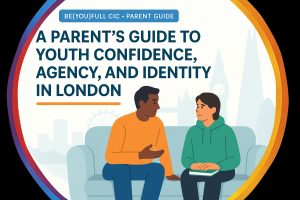How to Prevent Your Emotional Insecurity
- By BE.YOU.FULL
- In Blog

Preventing emotional insecurity is a journey that requires self-awareness, compassion, and proactive effort. By understanding your triggers, challenging negative thoughts, and surrounding yourself with positivity, you can build a solid foundation for success. Remember that you are not alone in your struggles, and every step you take towards emotional resilience is a step towards achieving your dreams. Embrace your journey, be you, and be full!
How to Prevent Your Emotional Insecurity from Succeeding
Emotional insecurity can be a formidable barrier on the road to success. It manifests as self-doubt, fear of rejection, and a lack of confidence, often undermining our ability to pursue our goals and dreams. However, by adopting proactive strategies, we can prevent emotional insecurity from holding us back. Here are some practical steps to cultivate emotional resilience and pave the way for success.
1. Understand Your Triggers
The first step in preventing emotional insecurity is to identify what triggers your feelings of inadequacy. Is it negative feedback, comparisons with others, or fear of failure? By recognising these triggers, you can develop strategies to manage your emotional responses. Keep a journal to track your feelings and the situations that provoke them, allowing you to gain insight into your vulnerabilities.
2. Cultivate Self-Awareness
Developing self-awareness is key to overcoming emotional insecurity. Take time to reflect on your strengths, achievements, and unique qualities. Acknowledge your talents and the value you bring to the table. Practicing mindfulness through meditation or deep-breathing exercises can also help you stay grounded and connected to your true self, reducing the influence of external validation.
3. Challenge Negative Thoughts
Our thoughts often shape our emotions. When self-doubt creeps in, challenge those negative thoughts. Ask yourself, “Is this thought based on facts or assumptions?” Replace self-critical thoughts with affirmations that highlight your abilities and potential. For example, instead of thinking, “I’ll never be good enough,” reframe it to, “I am capable, and I am constantly improving.”
4. Set Realistic Goals
Setting achievable goals can boost your confidence and help you build a sense of accomplishment. Break larger goals into smaller, manageable steps, and celebrate your progress along the way. This incremental approach allows you to experience success regularly, reinforcing your belief in your abilities and reducing feelings of insecurity.
5. Surround Yourself with Positivity
The people we spend time with can significantly impact our emotional state. Surround yourself with supportive and positive individuals who uplift and encourage you. Seek out mentors, friends, or communities that align with your aspirations and values. Their encouragement can help counteract feelings of inadequacy and inspire you to pursue your goals with confidence.
6. Embrace Failure as a Learning Opportunity
Fear of failure often feeds emotional insecurity. Instead of viewing failure as a setback, reframe it as a valuable learning experience. Each misstep offers insights that can propel you forward in your journey. By adopting a growth mindset, you’ll reduce the fear of making mistakes and become more resilient in the face of challenges.
7. Practice Self-Compassion
Treat yourself with the same kindness you would offer a friend. When you experience setbacks or self-doubt, practice self-compassion. Acknowledge that everyone struggles with insecurity at times and that it’s a normal part of the human experience. Affirm to yourself that you are worthy of love and success, regardless of your current circumstances.
8. Engage in Positive Self-Talk
The way you speak to yourself matters. Replace harsh criticism with positive affirmations. Create a list of empowering statements that resonate with you, such as “I am enough,” “I have the skills to succeed,” or “I am deserving of happiness.” Repeat these affirmations daily to reinforce a positive self-image and combat emotional insecurity.
9. Seek Professional Support
If emotional insecurity feels overwhelming, consider seeking support from a therapist or counsellor. Professional guidance can provide you with tools to navigate your feelings and develop healthy coping mechanisms. Therapy can be a safe space to explore your emotions and foster resilience.
How to Prevent Your Emotional Insecurity - FAQs
Understanding and managing emotional insecurity through self-awareness, reflection, and consistent inner work - the BE(YOU)FULL way.
What causes emotional insecurity?
How can I recognize signs of emotional insecurity?
What first step helps prevent emotional insecurity?
How can daily habits strengthen emotional stability?
How can mentoring or coaching reduce insecurity?
How does self-compassion protect against insecurity?
How can I stop comparing myself to others?
What mindset prevents insecurity long-term?
- Share:
You may also like

A Parent’s Guide to Youth Confidence, Agency, and Identity in London
- December 1, 2025
- by BE.YOU.FULL
- in Blog

The State of Youth Mentoring in London 2025


